Starship Troopers 20 years on: Verhoeven reveals all
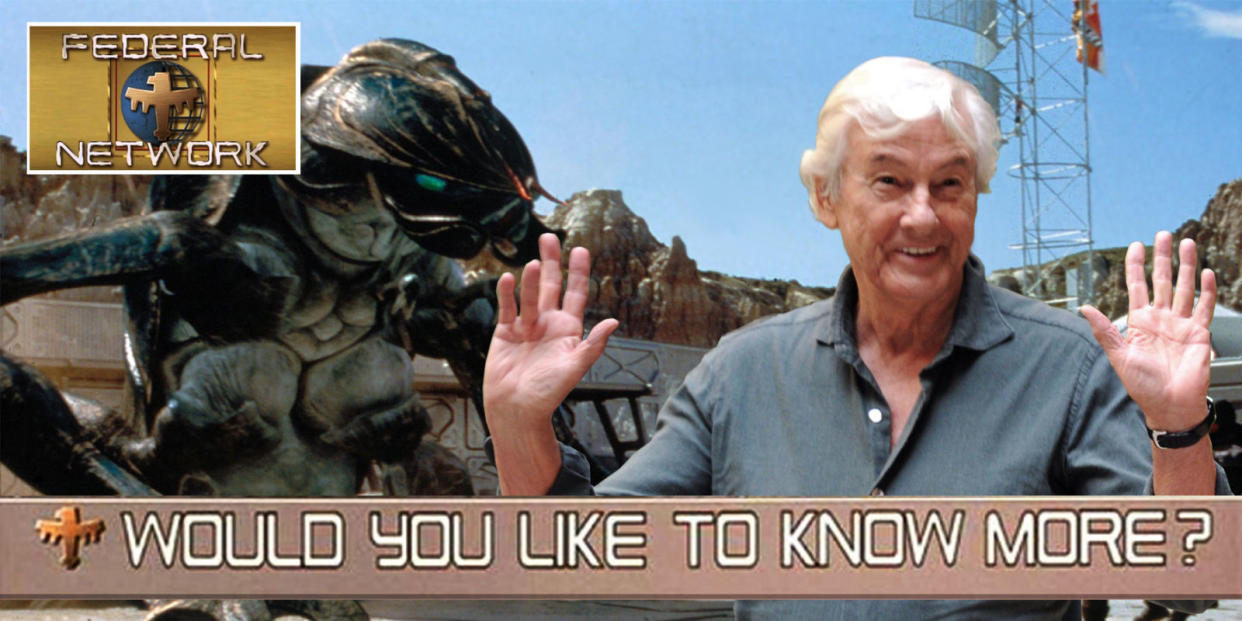
Here's a sample of the brutal reviews that greeted Paul Verhoeven's Starship Troopers on its 1997 release:
"Cheerfully lobotomized" – LA Times.
"Exactly like Star Wars – if you subtract a good story, sympathetic characters, intelligence, wit and moral purpose" – Washington Post.
Even critical guru Roger Ebert's mildly appreciative notice labelled it "one-dimensional", adding that "if Star Wars is humanist, Starship Troopers is totalitarian".
Twenty years later, though, Starship Troopers has undergone greater reappraisal than any movie of its time, maybe even of all time. Many respected outlets now see it as one of the best films of its decade, arguably even its iconoclastic director's greatest film.
Far from seeing it as totalitarian, viewers have come to accept its savage satire of militarised populism. Not to mention a public duped by "fake news" to justify the extermination of "the other". Sound just a little bit familiar?
We're all screwed
Paul Verhoeven himself, now a youthful 78 and still fiercely candid and intelligent, certainly isn't shy about drawing parallels to today's increasingly right-wing political landscape, not least the USA under Donald Trump.
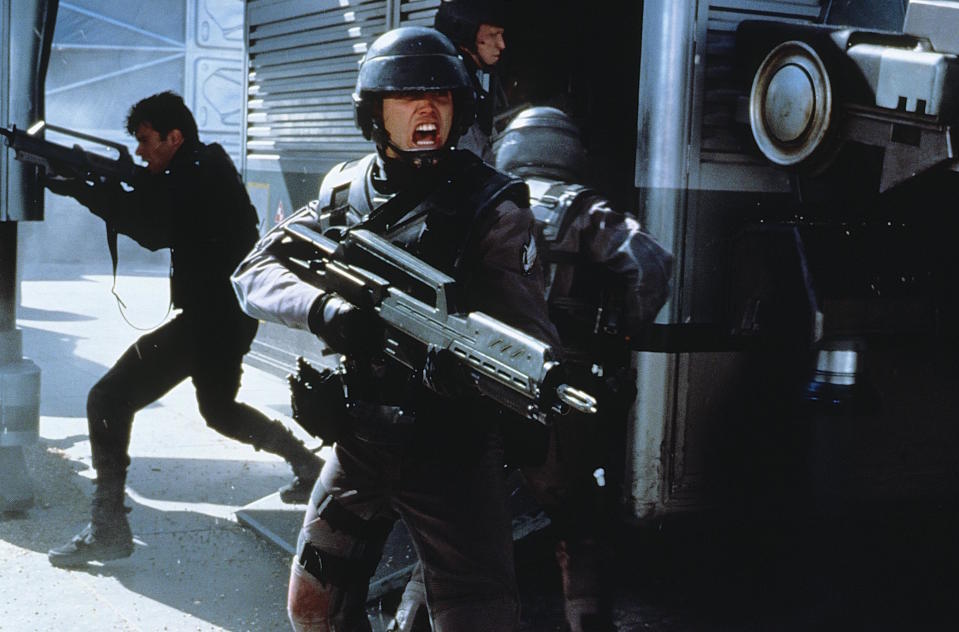
"For sure! No doubt!" he practically shouts. "I know that [screenwriter] Ed Neumeier and I were aware of elements in American society that seemed to have the possibility of a certain fascism, but I did not believe myself that the United States would be able and willing to go in that direction."
Would you like to know more..?
Welcome to the fascist utopia
Starship Troopers was originally a hugely popular 1959 novel by Robert A Heinlein. Heinlein was well known for advocating hardline, gung-ho foreign policy, and the story, about human soldiers fighting an interstellar war with giant arachnids, was often accused of glorifying war.
The liberal Verhoeven, unsurprisingly, wasn't interested in a movie adaptation that took Heinlein's politics at face value. What he and his RoboCop co-screenwriter Neumeier aimed for instead was to inflate Heinlein's overblown ideals to the max, flaunt their pomposity and then explode them like confetti.

"Ed and I disagreed with Robert Heinlein and we felt that we needed to counter with our own narrative," he explains. "Basically the political undercurrent of the film is that these heroes and heroines are living in a fascist utopia – but they are not even aware of it! They think this is normal. And somehow you are seduced to follow them, and at the same time, made aware that they might be fascists."
As a result, Starship Troopers doesn't just blur the line on supporting "our troops" on their bug-hunting mission; it obliterates that line like an anthill flooded by a vat of insecticide. "The only good bug is a dead bug!" is one of the catchy slogans the troops regularly parrot to boost morale.
Meanwhile, onscreen ads (the screen interface with its various tabs and links is a smart predictor of browser software) constantly talk up its military operations while demonising the enemy. It helps too that the arachnid hordes are screeching, scuttling, vicious eight-legged nightmares – rendered in award-calibre visuals by effects wizard Phil Tippett – that cannot be reasoned with, only destroyed.
90210 In Space
In stark contrast stand our cast of human pin-ups, with their chiselled jaws, shampoo-commercial hair and toned bodies. In fact, one of the (many) criticisms aimed at the film is that it's "90210 in space", a daytime soap among the stars.
Though Casper Van Dien, Denise Richards, Dina Meyer and company have all maintained screen careers, no-one ever accused them of being great thespians. Some Troopers defenders even claim that Verhoeven deliberately chose bad actors to push his satire even further.
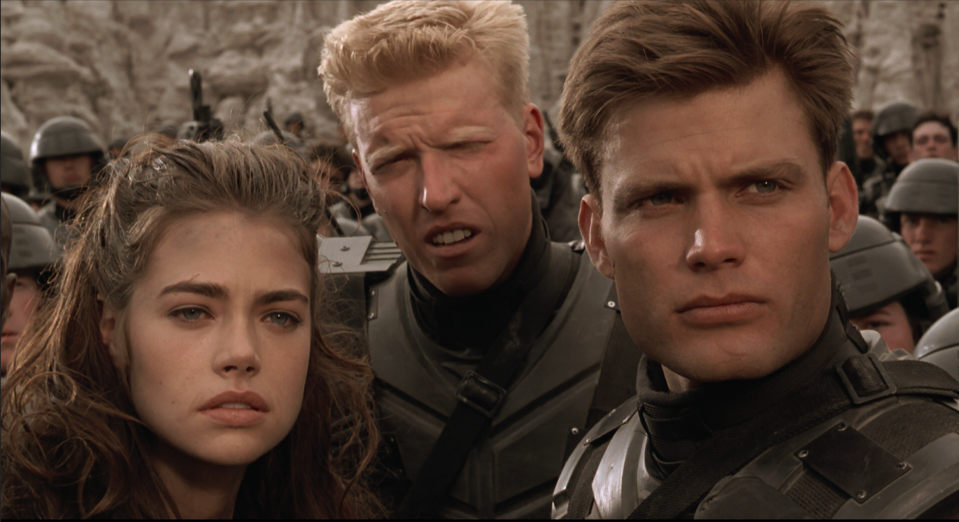
"No, not really," denies Verhoeven. "I took them because I wanted them to look like the people you see in Leni Riefenstahl's movie The Triumph of the Will. So it was a ploy, but more based on a visual aspect." Riefenstahl's infamous Nazi propaganda film tried to display the physical superiority of the Aryan race – an ideal appropriation for Verhoeven's fascist-baiting plan.
That said, even Verhoeven can't bring himself to praise their performances. "I probably was looking too much to the streamlined bodies and sculpted faces," he admits, "and perhaps paid not enough attention to all the acting stuff... I mean, I don't know, in retrospect you could also say that was the right way to do it, because it should be these kinds of people."
And he still speaks with affection about the actors. Behind-the-scenes footage, where his hands-on approach – always beside the camera, regularly acting out giant bug attacks himself – makes that clear.
One day's filming that didn't make it into the Making Of is an apocryphal incident during the marines' mixed-gender shower scene that Verhoeven happily confirms he stripped off for too to soothe his nervous young cast.

"Yeah, sure I did that. And it helped!" he says proudly. "My DoP Jost Vacano and I, we undressed and of course then everyone started to laugh. Then we shot the scene with no problem. Jost grew up in these, let's say nudity camps [sic], so he had no problem with it. For me, it was a bit more difficult but I said to Jost, 'Hey, we need to give an example...' He said 'Of course,' and boom!"
"It's a very depressing movie!"
Verhoeven's upfront nature and visceral style are at odds with the qualities most serious critics tend to value. Starship Troopers starts with a classroom scene in which Michael Ironside's scowling teacher exhorts "violence – the supreme authority from which all other authority is derived."
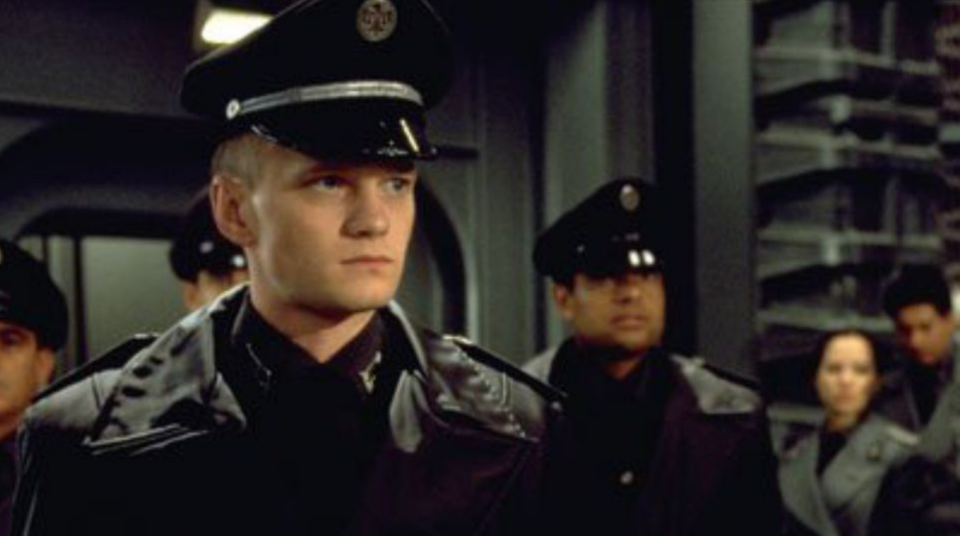
By the end of the film, Neil Patrick Harris and his fellow commanders are practically decked out in Nazi SS uniforms. The bugs are grotesque, relentless, while the humans are bright-eyed and cute. And given that Verhoeven uses shots of landing spacecraft that deliberately evoke (and were painstakingly copied from) the D-Day Normandy landings, it's perhaps easy to see how unobservant reviewers mistook Verhoeven's amped-up critique for advocacy.
Then there's the ending. Starship Troopers finishes with a final blast of triumphalism, an on-screen endorsement of his photogenic proto-fascists: "They'll keep fighting – and they'll win!"
"They're very happy to continue at the end into more war," sighs Verhoeven. "It's a very depressing movie!"
A critical failure
Little wonder that, following Verhoeven's mauling for his previous film, 1995's notorious soft-core Vegas exposé Showgirls, he got hammered again. The giddy, graphic excesses of sex and violence that define both his earlier Dutch hits (Turkish Delight, The Fourth Man) and later Hollywood output (Total Recall, Basic Instinct), always rubbed some audiences the wrong way.
But he could generally count on staunch defenders who saw through the surface provocations to the serious socio-cultural satire beneath.
Not here.
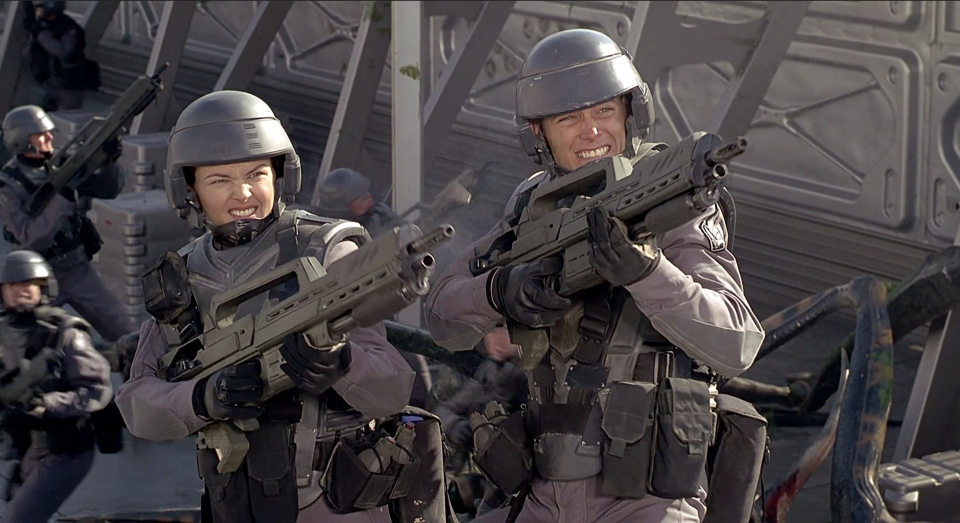
Now the attacks often had a personal edge. Post-Showgirls, he was even referred to as a "lapdance maven". Surely it was hard not to take it to heart?
"It's difficult to swallow but ultimately I always survive okay and do the work," he explains. "The only way to overcome these depressing things is to make another movie. The worst punishment would be that you cannot and you're stuck with the last movie where people destroyed you. But I think that didn't happen."
He's right – and not just through later critical and commercial hits like Black Book (2006) and his latest, Elle (2016). The reassessment of Starship Troopers (and even Showgirls) led to more nuanced readings of the films.
For example, if you listen carefully, tucked away in a galactic broadcast, you'll hear that humans started the entire conflict by colonising an off-limits galactic sector – ie, we invaded, and when the bug inhabitants defended themselves, we declared all-out war.
Vindication, Verhoeven agrees, is "nice, but the pragmatic effect is in reality more important than, let's say the emotional satisfaction that [critics] were wrong".
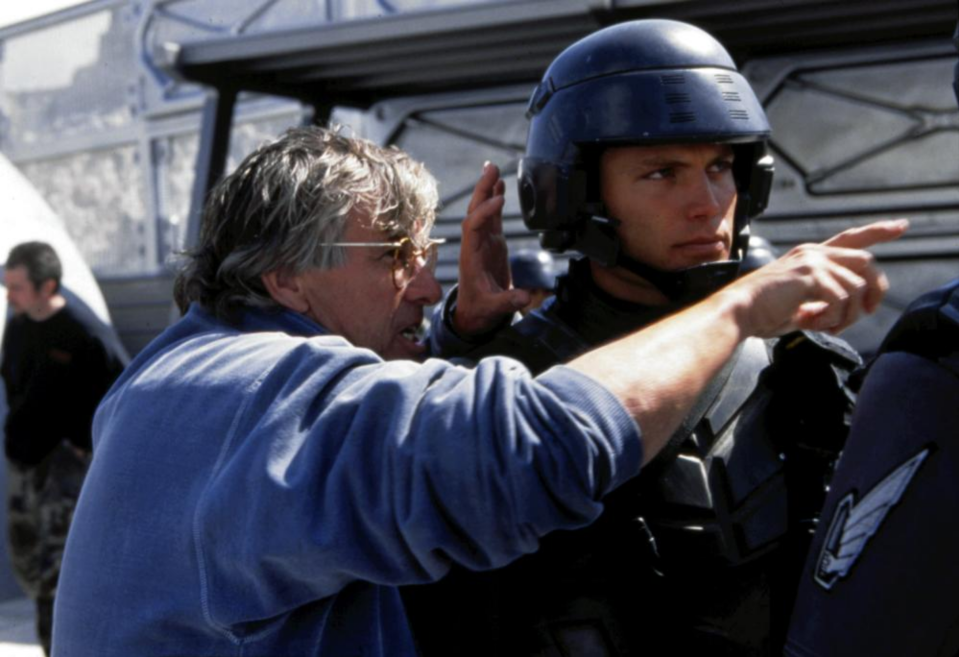
Ultimately, Paul Verhoeven may delight in messing with you but his overall point is clear as day. "War makes fascists of us all," he says simply. "If you compare it to the situation in the United States that has been created in the last couple of months, without saying that it's a prophecy, Starship Troopers turned out to be much more serious than we thought!"
Starship Troopers turns 20 this year.
STARSHIP TROOPERS: BY THE NUMBERS
Released: November 1997
Budget: $105m
Box-office take: $121.2m
Trivia
• Mark Wahlberg and James Marsden turned down the role of Johnny Rico, who was played in the end by Casper Van Dien.
• The film started as a script called Bug Hunt at Outpost 9, and was only later revised to become an adaptation of the Heinlein novel.
• Verhoeven deliberately lifted the opening advert for the mobile infantry shot-for-shot from Leni Riefenstahl's Triumph of the Will. He himself grew up in Nazi-occupied Holland.
•There are three sequels: Starship Troopers 2: Hero of the Federation, Starship Troopers 3: Marauder and Starship Troopers: Invasion. Plus an animated series called Roughnecks: Starship Trooper Chronicles which lasted for just one season.
•The starship Rodger Young was named after a US Medal of Honor recipient who was killed in the Solomon Islands while drawing fire from Japanese troops so that his platoon could escape unhurt. Like the movie's Sergeant Zim, he was an instructor who volunteered to be demoted to private so that he could join the front-line troops.
• This is Lieutenant Willy – he is killed in the battle of Klendathu early in the film – played by Steven Ford. His father was President Gerald Ford.

• The uniforms were later re-used by the Power Rangers Lost Galaxy series:
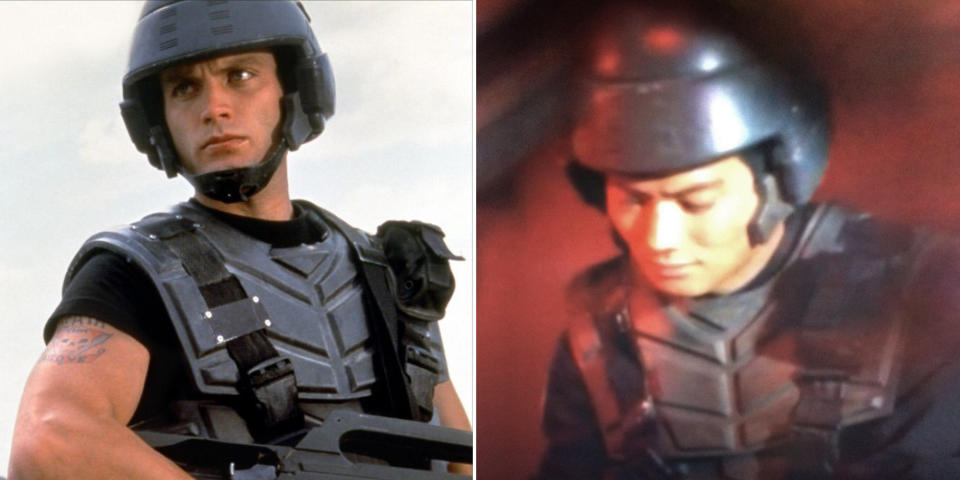
Want up-to-the-minute entertainment news and features? Just hit 'Like' on our Digital Spy Facebook page and 'Follow' on our @digitalspy Twitter account and you're all set.
You Might Also Like

 Yahoo News
Yahoo News 
